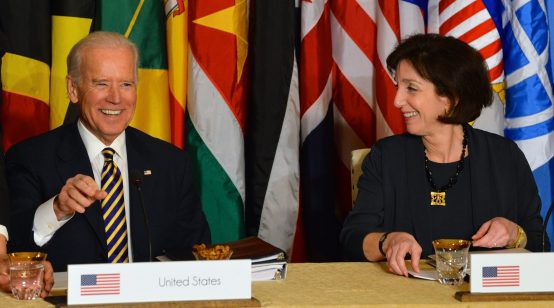
Steve Allen / Shutterstock
The UK’s climate change targets are world-leading. Yet there is no clear plan in place to achieve them. That is the stark message of a new progress report from the government’s official advisers, the Committee on Climate Change.
The Committee is forthright in its criticism of government. On its report card, assessing progress against 25 policies needed to meet carbon targets, there is just one green tick. But, beyond asking for the prime minister to set up a “climate cabinet”, the Committee has much less to say about how government – at both national and local level – should be reconfigured to make climate action a priority.
The stark truth is that no one is in charge. Under the UK’s Climate Change Act, there is a statutory requirement on the government as a whole to meet targets. This leaves the prime minister with ultimate authority, but no clarity about which department should do what.
The Department for Business, Energy and Industrial Strategy (BEIS) oversees progress, but other departments have no carbon targets or responsibilities, and BEIS cannot tell them what to do. Neither are there targets or responsibilities for local areas. The Committee on Climate Change can offer advice, but the route between this advice and policy delivery is, to put it politely, unclear.
This results in some serious contradictions. Transport results in a quarter of the UK’s emissions, yet the Department for Transport’s strategic plan, published just last month, fails to mention climate action as a key driver.
There is the odd reference to “clean growth” and “sustainability”, but also support for airport expansion and many new roads. The only policy that unequivocally contributes to the effort is the pledge to phase out diesel and petrol cars by 2040, which most commentators, including the CCC, have said is too little, too late.

BEIS recently told MPs it ‘expects with a very high level of confidence that the UK will need a lot more oil and gas for the next 25 years’
Mr.PK / shutterstock
Meanwhile, the Treasury and BEIS work together to maximize oil and gas extraction from the North Sea. When questioned by MPs, they dismissed the idea that this is incompatible with climate targets. The energy regulator, Ofgem, has a duty to protect consumers, but again, no clear carbon target or responsibility. As a result, many of its day-to-day decisions, like the recent review of charging arrangements for electricity networks, work against the transition to zero-carbon. Examples like this abound across government and its agencies.
At local level, the picture is no clearer. Local authorities have no statutory responsibility, and no specific resources, for climate action. Many have now shouldered responsibility by declaring a “climate emergency”, but when it comes to action they have limited control over policies and budgets, and little room for maneuvre.
A government set up to deliver climate action
As part of the IGov project at the University of Exeter, I have been helping to develop proposals for an institutional framework which would enable coordinated climate strategy, to implement the transition to zero-carbon. We advocate allocating carbon targets to each government department.
We also propose a sister organization to the Committee on Climate Change, which we are calling the “Energy Transformation Commission”. This body would implement the transformation process set by government, through a process of brokering, coordination, consensus-building and engagement. The ETC would take advice from the Committee on Climate Change and the National Infrastructure Commission, and works with all government departments. It would be a focal point for crucial decisions that need cross-government coordination, like the transition to electric vehicles, and decarbonization of home heating – two areas where the CCC says policies are lagging behind.

nrqemi / shutterstock
At local level, we advocate devolving climate governance to local authorities. This should take the form of a new statutory duty on local authorities, requiring them to produce a transformation plan, which includes setting and meeting devolved carbon budgets. Central government should give local authorities the freedom and funding to enable this process, letting them coordinate across energy, planning, transport and economic development.
Being clearer about climate responsibilities across government would provide the vital link between statutory targets and the policies to achieve them. It would make the policymaking process more transparent and less open to lobbying by those who stand to lose from decisive policy. Our research on the UK energy sector has shown that big energy companies, rather than the emerging innovators, have a disproportionate influence over governance decisions.
Opening up climate strategy to public debate would also strengthen the government’s hand: research shows that people want to see climate action, but are currently cut out of decisions. The recent decision by six parliamentary select committees to hold a citizens’ assembly on climate change is an encouraging step toward climate democracy.
It’s only been a month since the UK legislated for net-zero. Over the coming months, crucial decisions about implementation will be needed. There is nothing more critical than deciding who is in charge.
Rebecca Willis, Research Fellow, Exeter University; Professor in Practice, Lancaster University, Lancaster University
This article is republished from The Conversation under a Creative Commons license. Read the original article.





